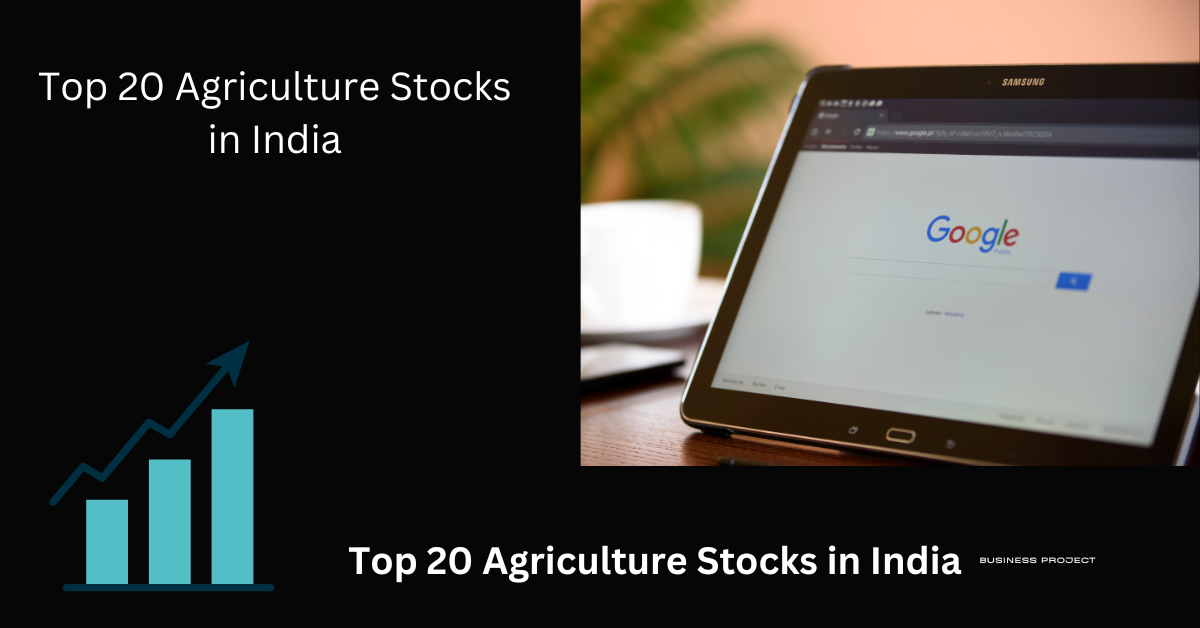Top 20 Agriculture Stocks in India
Top 20 Agriculture Stocks in India: Agriculture is the backbone of the Indian economy, contributing significantly to the nation’s GDP and providing employment to a vast majority of the population. With increasing focus on agricultural modernization, sustainability, and technology integration, agriculture-related stocks have become attractive for investors. Here are the top 20 agriculture stocks in India, along with a detailed analysis of each company.
1. UPL Limited
UPL Limited is a global leader in crop protection and sustainable agriculture solutions. It provides a wide range of products including herbicides, insecticides, fungicides, and seeds. The company’s robust global presence, extensive product portfolio, and focus on innovation make it a standout in the agricultural sector.
- Market Cap: Over INR 50,000 crore
- Key Strengths: Diversified revenue streams and sustainable practices
- Growth Drivers: Rising demand for crop protection chemicals and global expansion
2. Bayer CropScience Limited
Bayer CropScience is a subsidiary of the German multinational Bayer AG. It specializes in crop protection, seeds, and environmental science.
- Market Cap: Over INR 25,000 crore
- Key Strengths: Strong R&D capabilities and premium product offerings
- Growth Drivers: Technological advancements and an increasing focus on biotechnology

3. PI Industries
PI Industries focuses on custom synthesis, manufacturing, and agricultural chemicals. The company has a strong foothold in domestic and international markets.
- Market Cap: Around INR 40,000 crore
- Key Strengths: Strong pipeline of innovative products
- Growth Drivers: Expansion into new geographies and collaborations with global players
4. Coromandel International Limited
Part of the Murugappa Group, Coromandel International is a leading player in fertilizers and crop protection. It has a strong retail presence through its network of outlets.
- Market Cap: Over INR 35,000 crore
- Key Strengths: Integrated business model
- Growth Drivers: Increasing agricultural mechanization
5. Chambal Fertilisers and Chemicals Limited
One of India’s largest private-sector fertilizer producers, Chambal Fertilisers caters to the needs of millions of farmers across India.
- Market Cap: Around INR 15,000 crore
- Key Strengths: Operational efficiency
- Growth Drivers: Rising demand for fertilizers due to agricultural reforms
6. Godrej Agrovet Limited
Godrej Agrovet operates in animal feed, crop protection, oil palm, and dairy products. It is a diversified agribusiness company.
- Market Cap: Over INR 10,000 crore
- Key Strengths: Diversified portfolio
- Growth Drivers: Increasing focus on animal nutrition and oil palm cultivation
7. Dhanuka Agritech Limited
Dhanuka Agritech is a leading player in the crop protection industry, offering a wide range of agrochemicals.
- Market Cap: Over INR 5,000 crore
- Key Strengths: Strong distribution network
- Growth Drivers: Rising awareness about agrochemicals among farmers
8. Tata Chemicals Limited
Although primarily a chemicals company, Tata Chemicals has significant operations in fertilizers and crop protection products.
- Market Cap: Over INR 20,000 crore
- Key Strengths: Strong brand name and diversified product range
- Growth Drivers: Increasing adoption of specialty fertilizers
9. Rallis India Limited
Rallis India, a subsidiary of Tata Chemicals, is a leading agricultural solutions provider offering crop protection chemicals, seeds, and plant growth nutrients.
- Market Cap: Around INR 5,000 crore
- Key Strengths: Strong distribution network
- Growth Drivers: Launch of innovative crop care products
10. JK Agri Genetics Limited
JK Agri Genetics focuses on hybrid seeds for various crops including cotton, paddy, and maize.
- Market Cap: Around INR 500 crore
- Key Strengths: Focus on research-driven seed development
- Growth Drivers: Growing demand for high-yielding hybrid seeds
11. Heranba Industries Limited
Heranba Industries is a leading agrochemical company, manufacturing pesticides and crop protection products.
- Market Cap: Around INR 2,500 crore
- Key Strengths: Export-oriented business model
- Growth Drivers: Expansion in international markets
12. Kaveri Seed Company Limited
Kaveri Seeds is one of India’s largest seed producers, offering a variety of hybrid seeds for field crops and vegetables.
- Market Cap: Over INR 5,000 crore
- Key Strengths: Strong focus on R&D
- Growth Drivers: Increasing acceptance of hybrid seeds among farmers
13. National Fertilizers Limited (NFL)
NFL is a leading public-sector fertilizer company in India, producing urea and other fertilizers.
- Market Cap: Around INR 2,000 crore
- Key Strengths: Government backing and extensive reach
- Growth Drivers: Rising agricultural productivity
14. BASF India Limited
BASF India is a subsidiary of the global chemical giant BASF. It offers agricultural solutions including crop protection and seeds.
- Market Cap: Over INR 10,000 crore
- Key Strengths: Global expertise and innovative solutions
- Growth Drivers: Increasing focus on sustainable farming
15. Insecticides India Limited
Insecticides India manufactures a wide range of agrochemicals, including pesticides, herbicides, and fungicides.
- Market Cap: Around INR 1,500 crore
- Key Strengths: Strong domestic presence
- Growth Drivers: Increasing demand for pest control products
16. Deepak Fertilisers and Petrochemicals Corporation Limited
Deepak Fertilisers is a leading producer of industrial chemicals and fertilizers.
- Market Cap: Over INR 5,000 crore
- Key Strengths: Diversified revenue streams
- Growth Drivers: Growing demand for specialty fertilizers
17. Zuari Agro Chemicals Limited
Zuari Agro Chemicals is a leading manufacturer of fertilizers and agricultural inputs.
- Market Cap: Around INR 1,000 crore
- Key Strengths: Strong brand presence in Southern India
- Growth Drivers: Rising investments in infrastructure
18. Mangalore Chemicals and Fertilizers Limited
This company is the only manufacturer of chemical fertilizers in Karnataka, producing urea and other fertilizers.
- Market Cap: Around INR 1,500 crore
- Key Strengths: Regional dominance
- Growth Drivers: Government initiatives in agriculture
19. Nagarjuna Fertilizers and Chemicals Limited
Nagarjuna Fertilizers is a key player in nitrogenous fertilizers and agricultural inputs.
- Market Cap: Around INR 1,000 crore
- Key Strengths: Extensive rural network
- Growth Drivers: Increasing focus on sustainable farming
20. Sharda Cropchem Limited
Sharda Cropchem is an agrochemical company focusing on crop protection chemicals and seed treatments.
- Market Cap: Around INR 4,000 crore
- Key Strengths: Asset-light business model
- Growth Drivers: Expanding global footprint
What are Agriculture Stocks? A Complete Guide
Agriculture stocks are the shares of companies engaged in the agricultural sector and related industries. These companies are involved in activities like farming, seed production, fertilizers, pesticides, irrigation equipment, agricultural machinery, and food processing. In a country like India, where agriculture forms the backbone of the economy, agriculture stocks play a vital role in the stock market.
Key Categories of Agriculture Stocks
- Seed and Fertilizer Companies
- These companies produce high-yield and quality seeds along with essential fertilizers to boost crop production.
- Examples: UPL, Rallis India, Coromandel International.
- Agricultural Machinery and Equipment Manufacturers
- Companies that manufacture essential tools like tractors, harvesters, and modern irrigation systems to improve farming efficiency.
- Examples: Mahindra & Mahindra, Escorts, VST Tillers Tractors.
- Food Processing Companies
- These companies process, package, and distribute agricultural produce such as grains, dairy, and other staples.
- Examples: ITC, Britannia, Nestlé India.
- Pesticide and Crop Protection Chemical Manufacturers
- Firms producing pesticides and crop-protection chemicals to safeguard crops from pests and diseases.
- Examples: PI Industries, Bayer CropScience.
- Agri-Tech Companies
- Emerging firms using technology for smart farming solutions like precision agriculture, drones, and data analytics.
- Examples: Jain Irrigation Systems, Shakti Pumps.
Why Invest in Agriculture Stocks?
- Consistent Demand:
- Agriculture forms the basis of human survival, ensuring steady demand for agricultural products and related services.
- Government Support:
- Agriculture receives continuous support from the government through subsidies, incentives, and policies like MSP (Minimum Support Price).
- Long-Term Growth Potential:
- With rising population and increasing global food demand, agriculture-related companies are poised for growth.
- Export Opportunities:
- India’s agricultural exports, such as rice, wheat, and spices, contribute significantly to the economy, benefiting companies in this sector.
Risks Associated with Agriculture Stocks
- Dependence on Weather:
- The agricultural sector is highly dependent on favorable weather conditions, especially monsoons. Droughts or floods can significantly impact profits.
- Price Volatility:
- Fluctuations in raw material costs and agricultural commodity prices can affect the profitability of these companies.
- Policy Changes:
- Sudden changes in government policies, such as export restrictions or new regulations, can pose challenges.
- Global Market Impact:
- International factors like trade policies, import-export restrictions, and global commodity prices can influence the performance of agriculture companies.
Points to Consider Before Investing
- Financial Health: Analyze the company’s balance sheet, revenue growth, and profitability.
- Sector Trends: Stay updated on trends like organic farming, sustainable agriculture, and agri-tech innovations.
- Diversification: Spread your investment across different segments of agriculture stocks to mitigate risks.
- Long-Term Outlook: Agriculture stocks are often suitable for long-term investors due to their growth potential over time.
Conclusion
Investing in agriculture-related stocks offers significant potential due to the ever-growing importance of the agricultural sector in India. These companies not only contribute to the nation’s food security but also offer substantial opportunities for long-term wealth creation. Investors should consider their risk appetite and conduct thorough research before investing in these stocks.


